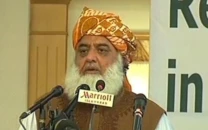Start killing off the channels
For the Pakistani television business to live, most of the news channels must die.

For the Pakistani television business to live, most of the news channels must die. PHOTO: EXPRESS/FILE
The problem is a simple one: according to Dawn’s advertising Aurora magazine, during 2012, Pakistani television stations earned about Rs21.6b in revenue that has to be split not just among the 25 news channels, but also the 23 entertainment channels, 14 regional channels, seven music channels, three religious channels, three food channels, and the dozens of other assorted channels.
Against 25 news channels that broadcast 24 hours a day in Pakistan, the US, the largest media market in the world, has just three mainstream channels, and three business channels. For Pakistan to have quadruple the number of news channels as the US makes no sense.
Advertisers are not going to start spending more money just because there are more channels. TV networks get a slice of that pie, depending on how many viewers they reach. The pie is growing, but the more channels there are, the more slices there have to be.
The less revenue a channel has, and the more fiercely it needs to compete for eyeballs to get the next advertising rupee, the less likely it is to invest in high-quality content.
It takes a lot more than a ditzy host and a camera crew to do a show that explains to people why, for example, the country has an energy crisis and why their lights are going out. You need an intelligent host who could be making millions elsewhere, and you need this person to be paired with a large team of analysts and reporters dedicated to just this show in order to be able to pull off a high quality production that raises the level of public debate while keeping viewers engaged.
The problem with doing such a show is that the ditzy host and camera crew come cheap. They will attract as many viewers as that international-banker-turned-anchor with his expensive analyst staff, and probably faster. So instead of a high-minded debate on possible solutions to the energy crisis, we get Maya Khan hounding young people in parks.
Now imagine this scenario: instead of 25 there were only three channels chasing after the Rs9.5 billion in advertising that gets spent on news channels. So even the smallest news channel would probably be pulling in at least around Rs2 billion in revenue (which is currently what the highest rated news channel makes).
There would be a lot more money to go around at the channels, and a lot less paranoia about the ratings. Who knows? They might even give a job to a LUMS professor who wants to do a show about public policy matters.
Now imagine if we had such a show in the early Musharraf years when he started promoting the use of natural gas. Maybe, just maybe, instead of the economically illiterate “commerce” reporters in Islamabad, the government would have had a well-credentialed expert asking them the right questions — do we have enough gas to sustain our energy needs, can we find other cheap sources of energy — and we may have avoided the disastrous policies that led to the electricity and gas shortages we have now.
But we did not get that. Instead, we had Zaid Hamid musing about Jewish conspiracies, Talat Hussain spending a whole hour trying to deny that the 2008 Mumbai attacks were done by Pakistanis and Hamid Mir promoting the water car. Let us hope, for the sake of our republic, that the advertisers come to their senses and stop patronising more than three or four news channels and let the rest just die off, starved of revenue and withering on the vine of economic infeasibility.
Published in The Express Tribune, Sunday Magazine, May 5th, 2013.
Like Express Tribune Magazine on Facebook to stay informed and join the conversation.



















COMMENTS
Comments are moderated and generally will be posted if they are on-topic and not abusive.
For more information, please see our Comments FAQ